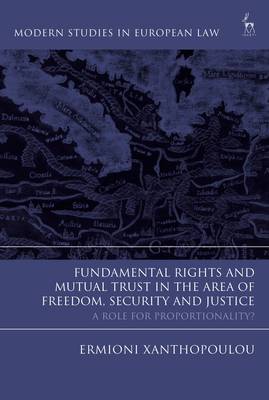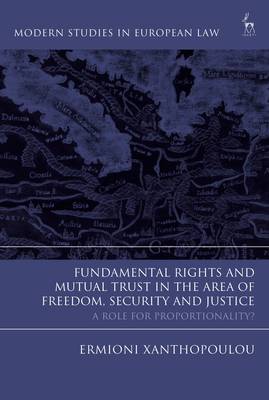
- Afhalen na 1 uur in een winkel met voorraad
- Gratis thuislevering in België vanaf € 30
- Ruim aanbod met 7 miljoen producten
- Afhalen na 1 uur in een winkel met voorraad
- Gratis thuislevering in België vanaf € 30
- Ruim aanbod met 7 miljoen producten
Zoeken
Fundamental Rights and Mutual Trust in the Area of Freedom, Security and Justice
A Role for Proportionality?
Ermioni Xanthopoulou
€ 203,95
+ 407 punten
Omschrijving
This book explores the relationship of mutual trust and fundamental rights in the Area of Freedom, Security and Justice (AFSJ) of the European Union and asks whether there is any role for proportionality. Mutual trust among Member States has long been presumed by the Court in a manner that mutual recognition was prioritised in regard to, but to the detriment of, the protection of fundamental rights. After thoroughly reviewing this relationship, this book offers a comprehensive framework of proportionality and explores its impact on the protection of fundamental rights in a mutual trust environment. It applies a theoretical and a normative framework of proportionality to two case studies (EU criminal and asylum law) by reference to several fundamental rights, enabling a carefully constructed analysis with useful parallels. The book argues that such analysis, based on proportionality, is not always desirable and helpful for the protection of fundamental rights in this area and thoroughly explores its impact on the protection of fundamental rights vis-à-vis mutual trust.
Specificaties
Betrokkenen
- Auteur(s):
- Uitgeverij:
Inhoud
- Aantal bladzijden:
- 248
- Taal:
- Engels
- Reeks:
Eigenschappen
- Productcode (EAN):
- 9781509922253
- Verschijningsdatum:
- 30/04/2020
- Uitvoering:
- Hardcover
- Formaat:
- Genaaid
- Afmetingen:
- 156 mm x 234 mm
- Gewicht:
- 521 g

Alleen bij Standaard Boekhandel
+ 407 punten op je klantenkaart van Standaard Boekhandel
Beoordelingen
We publiceren alleen reviews die voldoen aan de voorwaarden voor reviews. Bekijk onze voorwaarden voor reviews.








